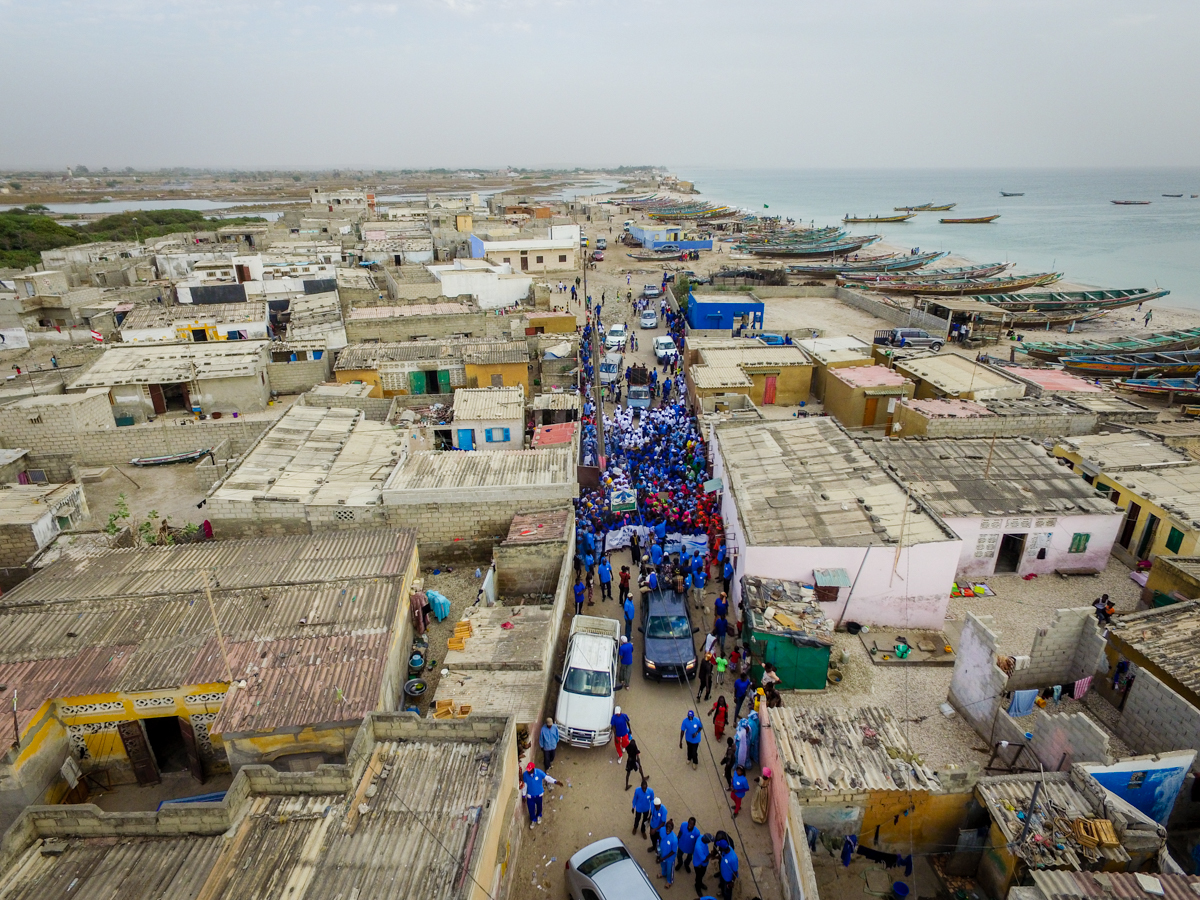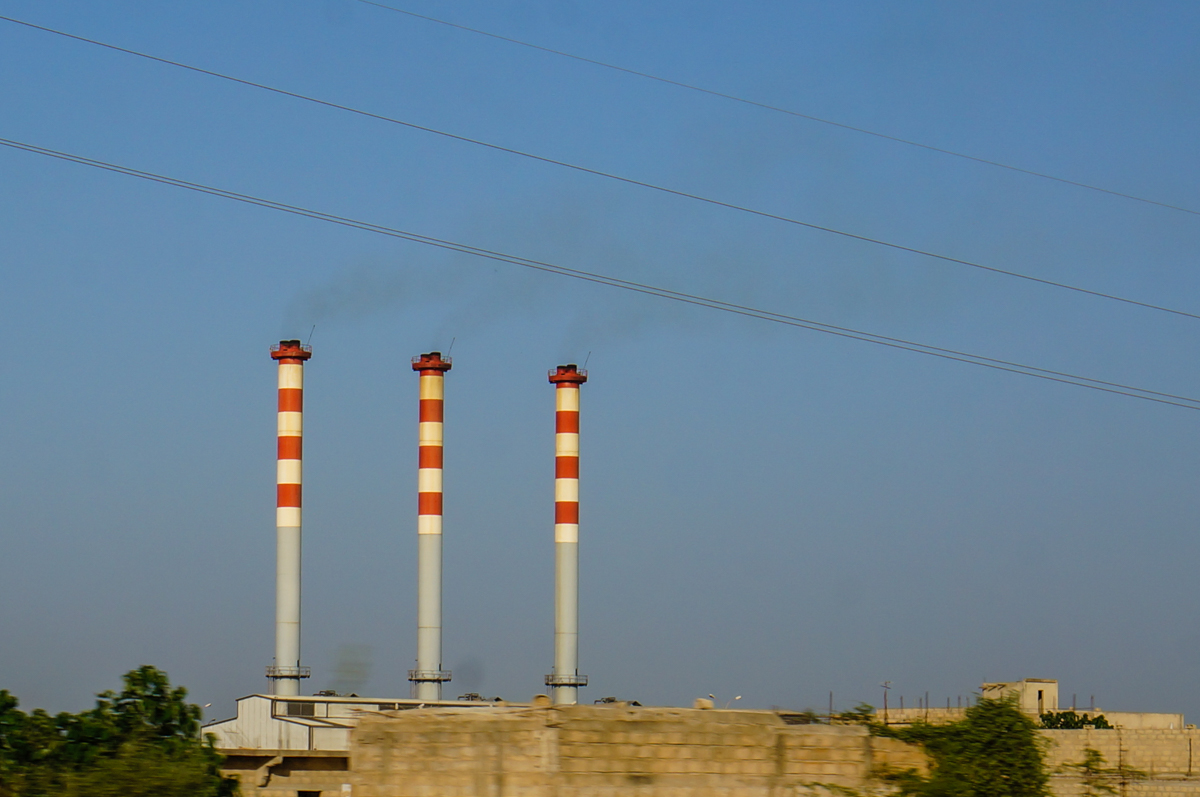It Takes a Village…to Say No to Coal | Polluting Infrastructure
By: ajcarapella

By Chris Wilke and Daouda Gueye
After years of advocacy, Bargny Coast Waterkeeper is celebrating the closure of the Sendou coal-fired power station in Senegal.
The small coastal fishing village of Bargny is located just 35 kilometers (22 miles) from the Senegalese capital city of Dakar at the westernmost tip of the African continent, on the shores of the Atlantic Ocean. The community is deeply tied to the sea, and its artisanal fishery employs thousands of fishermen and fish processors.
Since 2008, a community coalition — including the first Waterkeeper in Senegal, Hann Baykeeper — had been locked in a pitched battle against the proposed 125-megawatt Sendou Power Plant due to the severe risks it posed to community health and the surrounding ecosystems. The leaders of this community movement would eventually form Bargny Coast Waterkeeper.
Paradoxically, the plant was located on land intended for rehousing victims of sea level rise, coastal erosion, and climate change. Also located there was a processing zone for fishery products where 1,000 women work. The proximity of this coal-powered plant to living areas and waterways clearly violated the rules of Senegal’s Environmental Code.
Enter the Waterkeeper. To fight the proposed plant, Bargny Coast Waterkeeper and its allies would use a variety of approaches anchored in solidarity with the community. With support from a growing coalition, including Waterkeeper Alliance and nearby Hann Baykeeper, they marched, they educated, they strategized, and, eventually, they litigated. In November 2015, in advance of the historic United Nations COP21 meeting on climate change in Paris, nearly 2,000 people gathered in the small town of Bargny to say “Non au Charbon,” or “No to Coal,” and “No to the Power Plant at Bargny.” The following year, after a series of public workshops and trainings on environmental law hosted by Waterkeeper Alliance and other experts, an official complaint was filed by Daouda Gueye, executive director of Bargny Coast Waterkeeper, and Cheikh Fadel Wade, the Waterkeeper, on behalf of the community coalition.
However, citizen complaints like this often take time to resolve, and despite the clear violations of land use regulations, the power plant moved forward and came online in October 2018 over intense community objections. It was, however, plagued by technical problems from the outset, and never ran at full capacity, due in part to community demands that led to several changes in the process. In July 2019, after less than a year of operation, the plant had to shut down due to technical problems and the litigation. In this brief time, the plant spewed air pollution into the community, and the improperly stored coal ash, pushed aloft by desert winds, remains a health threat to this day.
“Litigation was a strong contributing factor to the power plant shutdown and abandonment of coal as an energy source,” stated Gueye. “Although no court ruled in our favor, the National Assembly made a memorandum in our favor to the head of the state of Senegal, which led to the ultimate decision.”
In December 2019, in the face of increasing pressure and lobbying, the President of Senegal declared the country was giving up coal. Though the plant has been shut down, dangerous coal ash continues to blow through the community, and a thorough cleanup assessment of the plant site has not been done. And while the plant will not use coal as a fuel source moving forward, a planned transition to natural gas has not been evaluated for risks and faces threats from sea level rise at the site. Offshore oil drilling also looms on the horizon, indicating the fights are far from over.
Fadel Wade maintains the group’s first duty is to the community. “The project promoters have never taken into account the concerns of the community, nor sought solutions to reduce the negative impacts of the project on the population, economic activities, health, and the environment,” stated Wade.
In 2020, amid the COVID-19 pandemic, Bargny Coast Waterkeeper continued its work of safeguarding the local community by distributing hand sanitizer and face masks. The group took time to celebrate the historic fossil fuel victory through virtual meetings, and it continues fighting dangerous fossil fuels by informing people of the risks and demanding a more thorough evaluation and oversight by the government.
Moving forward, Bargny Coast Waterkeeper turns to ensuring the existing coal ash is cleaned up and the continued development of fossil fuels in Bargny is stopped.
En Français (via Google Translate)

Par Chris Wilke et Daouda Gueye
Après des années de plaidoyer, Bargny Coast Waterkeeper célèbre la fermeture de la centrale au charbon de Sendou au Sénégal.
Le petit village de pêcheurs côtiers de Bargny est situé à seulement 35 kilomètres (22 miles) de la capitale sénégalaise de Dakar à la pointe la plus occidentale du continent africain, sur les rives de l’océan Atlantique. La communauté est profondément liée à la mer et sa pêche artisanale emploie des milliers de pêcheurs et de transformateurs de poisson.
Depuis 2008, une coalition communautaire – y compris le premier Waterkeeper du Sénégal, Hann Baykeeper – avait été enfermée dans une bataille rangée contre la centrale électrique de Sendou de 125 mégawatts proposée en raison des risques graves qu’elle posait pour la santé de la communauté et les écosystèmes environnants. Les dirigeants de ce mouvement communautaire finiraient par former Bargny Coast Waterkeeper.
Un élément clé de la lutte concernait l’utilisation de terres qui avaient paradoxalement été destinées au relogement des victimes de l’élévation du niveau de la mer, de l’érosion côtière et du changement climatique. Le terrain de l’usine abrite également une zone de transformation des produits de la pêche où travaillent 1 000 femmes; cette proximité des lieux de vie et des voies navigables a clairement bafoué les règles du code de l’environnement du Sénégal.
Entrez le Waterkeeper. Pour lutter contre la plante proposée, Bargny Coast Waterkeeper et ses alliés utiliseraient une variété d’approches ancrées dans la solidarité avec la communauté. Avec le soutien d’une coalition grandissante, y compris Waterkeeper Alliance et le voisin Hann Baykeeper, ils ont marché, ils ont éduqué, ils ont élaboré une stratégie et, finalement, ils ont plaidé. En novembre 2015, avant la réunion historique de la COP21 des Nations Unies sur le changement climatique à Paris, près de 2 000 personnes se sont rassemblées dans la petite ville de Bargny pour dire «Non au Charbon» ou «Non au charbon» et «Non au pouvoir» Usine à Bargny. » L’année suivante, après une série d’ateliers publics et de formations sur le droit de l’environnement organisés par Waterkeeper Alliance et d’autres experts, une plainte officielle a été déposée par Daouda Gueye, directeur exécutif de Bargny Coast Waterkeeper, et Cheikh Fadel Wade, le Waterkeeper, au nom de la coalition communautaire.
Cependant, les plaintes des citoyens comme celle-ci prennent souvent du temps à être résolues et, malgré les violations manifestes des réglementations relatives à l’utilisation des terres, la centrale a progressé et a été mise en service en octobre 2018 suite aux vives objections de la communauté. Il a cependant été en proie à des problèmes techniques dès le départ compte tenu des revendications des communautés ayant entraîné plusieurs changements du processus et n’a jamais fonctionné à pleine capacité. En juillet 2019, après moins d’un an de fonctionnement, l’usine a dû fermer en raison de problèmes techniques et de litiges. Pendant cette brève période, l’usine a craché de la pollution atmosphérique dans la communauté, et les cendres de charbon mal stockées, poussées en altitude par les vents du désert, restent une menace pour la santé à ce jour.
«Les litiges ont fortement contribué à l’arrêt de la centrale électrique et à l’abandon du charbon comme source d’énergie», a déclaré Gueye. «Bien qu’aucun tribunal ne se soit prononcé en notre faveur, l’Assemblée nationale a adressé un mémorandum en notre faveur au chef de l’Etat du Sénégal, qui a conduit à la décision finale.
En décembre 2019, face à une pression croissante, le président du Sénégal a déclaré que la centrale à charbon ne rouvrirait pas. Bien que l’usine ait été fermée, des cendres de charbon dangereuses continuent de souffler dans la communauté, et une évaluation de nettoyage approfondie du site de l’usine n’a pas été effectuée. Et bien que la centrale n’utilisera pas le charbon comme source de combustible à l’avenir, une transition prévue au gaz naturel n’a pas été évaluée pour les risques et fait face aux menaces de l’élévation du niveau de la mer sur le site. Le forage pétrolier offshore se profile également à l’horizon, indiquant que les combats sont loin d’être terminés.
Fadel Wade maintient que le premier devoir du groupe est envers la communauté. «Les promoteurs du projet n’ont jamais pris en compte les préoccupations de la communauté, ni cherché des solutions pour réduire les impacts négatifs du projet sur la population, les activités économiques, la santé et l’environnement», a déclaré Wade.
En 2020, au milieu de la pandémie COVID-19, Bargny Coast Waterkeeper a poursuivi son travail de sauvegarde de la communauté locale en distribuant du désinfectant pour les mains et des masques faciaux. Le groupe a pris le temps de célébrer la victoire historique des combustibles fossiles lors de réunions virtuelles, et il continue de lutter contre les combustibles fossiles dangereux en informant les gens des risques et en exigeant une évaluation et un contrôle plus approfondis de la part du gouvernement.
À l’avenir, Bargny Coast Waterkeeper s’assure que les cendres de charbon existantes sont nettoyées et que le développement continu des combustibles fossiles à Bargny est arrêté.